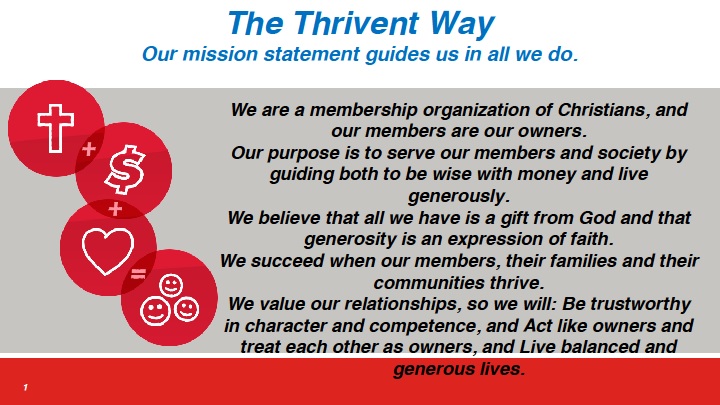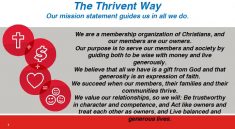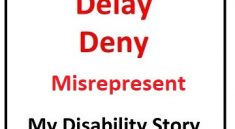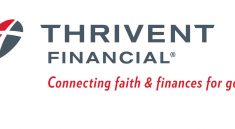Thrivent and fraternal insurance, Why you should not buy their insurance, Erickson Vs Thrivent reveals all, Retroactive contract changes, Mandated dispute resolution and arbitration, Companies control and abuse, Give up day in court
Thinking about buying insurance from Thrivent or another Fraternal organization? Read Erickson Vs Thrivent from February 1, 2017.
RAYMOND J. ERICKSON,
Plaintiff,
VS.
THRIVENT INSURANCE AGENCY INC.,
d/b/a THRIVENT FINANCIAL FOR
LUTHERANS,
Defendant.
“This case involves an insurance contract between Plaintiff Raymond Erickson and a .
fraternal benefit society. Insurance contracts issued by a fraternal benefit society generally
include the society’s bylaws, as well as any subsequent amendments to the bylaws, provided that
the amendments do not reduce the benefits promised in the original contract. This Court must
decide whether Erickson is bound by an arbitration clause that was not in his original insurance
contract but was later added to the fraternal benefit society’s bylaws. Because the arbitration
clause does not reduce Erickson’s benefits under the contract, this Court finds that the clause
applies to him and requires him to arbitrate his claims.”
“In early 2002, Lutheran Brotherhood merged into a Wisconsin fraternal benefit society
called Aid Association for Lutherans (AAL), with AAL continuing on as the surviving entity.
Doc. 16 at ii 3. AAL changed its name to Thrivent following the merger but retained its Articles
of Incorporation and Bylaws. Doc. 16 at iiii 3, 6. These Bylaws include a Dispute Resolution
Bylaw that AAL’s board of directors adopted in 1999. Doc. 16 at iiii 6, 7. Initially adopted as
Section 12 of the bylaws, the Dispute Resolution Bylaw requires mediation and, if that fails,
binding arbitration. Doc. 16 at iiii 6, 7; Doc. 16-1at4-5; Doc. 16-2 at 6-7. The purpose of the
Bylaw is to provide the “sole means” to resolve disputes between Thrivent and its members and
insureds. Doc. 16-1 at 4-5; Doc. 16-2 at 6-7. It applies ”to all claims, actions, disputes and
grievances of any kind or nature whatsoever.” Doc. 16-1 at 4; Doc. 16-2 at 6. AAL filed the
Dispute Resolution Bylaw with the Wisconsin Office of the Commissioner of Insurance. Doc.
16 at ii 11.. In December 2008, Thrivent amended its Bylaws by, among other things,
renumbering the Dispute Resolution Bylaw as Section 11. Doc. 16 at ii 7; Doc. 16-1 at 4-5.
Thrivent filed the December 2008 amendments with the Wisconsin Office of the Commissioner
of Insurance and gave notice of the amendments to all state insurance departments, including the
South Dakota Division of Insurance. Doc. 16 at iii! 9, 12; Docs. 16-3, 16-4. Thrivent notified its
members of the amendments through the Winter 2009 edition of its official publication. 1 Doc.
16 at iJ 10.
Erickson made a claim for benefits under the contract. in December 2014 after he moved
into a long-term care facility. Doc. 1 at 13. Thrivent paid Erickson benefits for some time, but
terminated them in November 2015. Doc. 1 at 16, 18. Erickson then sued Thrivent in this
Court, asserting claims for breach of contract, bad faith, breach of fiduciary duty, punitive
damages, and attorney’s fees. Doc. 1. The parties mediated before Magistrate Judge Veronica
Duffy, but were unable to resolve their dispute. Doc. 11. Thereafter, Thrivent filed a Motion to
Compel Arbitration and argued that the Federal Arbitration Act (FAA), 9 U.S.C. §§ 1-14, and
the Dispute Resolution Bylaw require this Court to stay the case and compel arbitration. Docs.
14, 15, 21. Erickson opposed the motion, contending that the Dispute Resolution Bylaw is
unenforceable for several reasons.”
“State contract law governs whether a valid arbitration agreement exists between Erickson
and Thrivent. First Options of Chi .. Inc. v. Kaplan, 514 U.S. 938, 944 (1995). This Court is
sitting in diversity jurisdiction, so it applies South Dakota’s choice-of-law rules to determine
which state’s laws govern whether a valid arbitration agreement exists. Dakota Foundry, 891 F.
Supp. 2d at 1095. The parties disagree on which state’s law should apply, with Thrivent arguing
for Wisconsin law and Erickson arguing for South Dakota law.”
“Thrivent argues that Wisconsin law governs because Thrivent is a fraternal benefit
society domiciled in Wisconsin and organized under Wisconsin law. Chapter 614 of
Wisconsin’s statutes generally requires that fraternal benefit societies have a lodge system, a
representative form of government, and provide insurance and other benefits to their members.
Wis. Stat. § 614.01. Consistent with Wisconsin law, Thrivent is a nonprofit organization
governed by a member-elected board of directors. Id. §§ 614.01, 614.42; Doc. 16 at if 4. Each
Thrivent benefit member is entitled to one vote in the board of directors’ election, and every
member of the board of directors must also be a benefit member of Thrivent. Doc. 16 at ii 4;
Doc. 16-1 at 2. Thrivent is organized under the lodge system, with nearly seven hundred local
lodges across the United States. Doc. 16 at ii 5. Thrivent provides insurance and several other
benefits to its members. Doc. 16 at ii 5.”
“The issue of which state’s law applies does not raise a material question of fact because
the Dispute Resolution Bylaw constitutes a valid arbitration agreement under Minnesota, South
Dakota, and Wisconsin law. Minnesota, South Dakota, and Wisconsin have all enacted statutes
regulating fraternal benefit societies. Minn. Stat.§§ 64B.Ol–64B.48; SDCL §§ 58-37A-1 to 58-
37A-39; Wis. Stat. §§ 614.01–614.96, 632.93. Under these laws, a fraternal benefit society
insurance contract consists of the insurance certificate, the member’s application, and the laws of
the society. Minn. Stat. § 64B.19; SDCL § 58-37A-19; Wis. Stat. § 632.93. Critically,
Minnesota, South Dakota, and Wisconsin statutes recognize that contracts between a fraternal
benefit society and its members include later amendments to the society’s laws, provided that the
amendments do not destroy or diminish the benefits promised in the original contract. . Minn.
Stat.§ 64B.19(2) (“Any changes, additions, or amendments to the laws of the society duly made
or enacted subsequent to the issuance of the certificate, shall bind the owner and the
beneficiaries, and shall govern and control the benefit contract in all respects the same as though
the changes, additions, or amendments had been made prior to and were in force at the time of
the application for insurance, except that no change, addition or amendment shall destroy or
diminish benefits that the society contracted to give the owner as of the date of issuance.”);
SDCL § 58-37-A-19 (“Any changes, additions or amendments to the laws of the society made or
enacted after the issuance of the certificate, bind the owner and the beneficiaries, and govern and
control the benefit contract in all respects the same as though the changes, additions, or
amendments had been made before and were in force at the time of the application for insurance.
However, no change, addition, or amendment may destroy or diminish benefits which the society .
contracted to give the owner.as of the date of issuance.”); Wis. Stat. § 632.93(2) (“[A]ny changes
in the laws of a fraternal made subsequent to the issuance of a policy or certificate bind the
owner and any beneficiary under the policy or certificate as if they had been in force at the time
of the application, so long as they do not destroy or diminish benefits promised in the policy or
certificate.”). As required by Minnesota, South Dakota and Wisconsin law, Minn. Stat.
§ 64B.19; SDCL § 58-37-A-19; Wis. Stat.§ 632.93, Erickson’s contract states that the Articles
of Incorporation and Bylaws, including any later amendments, are part of the agreement: ”
“III. Conclusion
For the reasons stated above, it is hereby
ORDERED that Thrivent’s Motion to Compel Arbitration and Stay Proceedings, Doc. 14,
is granted. It is further
ORDERED that this case is stayed and the parties must proceed to arbitration m
accordance with the terms of the contract.”
Read more:
https://law.justia.com/cases/federal/district-courts/south-dakota/sddce/4:2016cv04044/58823/22/




